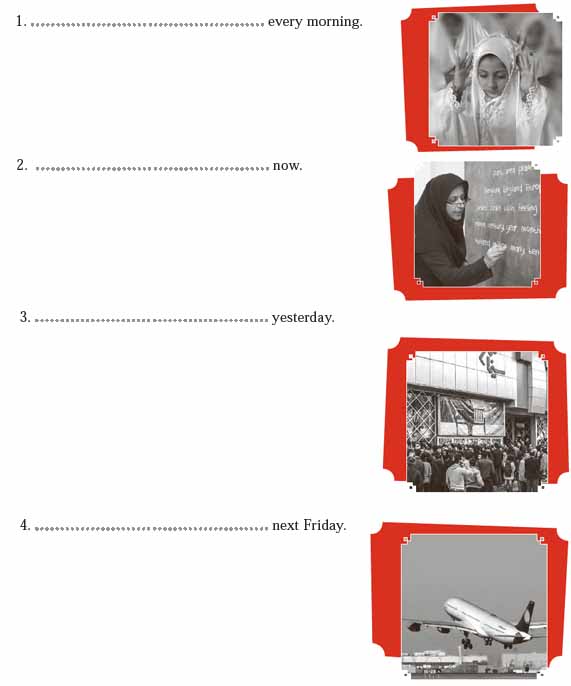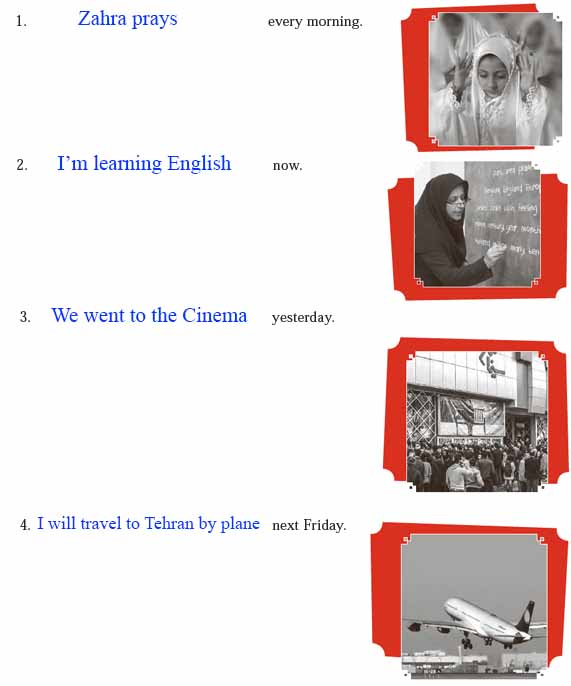جواب فصل 1 Underestanding People کتاب کار انگلیسی یازدهم
تعداد بازدید : 3.13Mپاسخ به تمامی سوالات فصل Underestanding People - حل المسائل فصل 1 Underestanding People - گام به گام 1401 کتاب کتاب کار انگلیسی یازدهم - گام به گام کتاب کتاب کار انگلیسی یازدهم مطابق با آخرین تغییرات کتب درسی
Get Ready صفحه 8 درس Underestanding People کتاب کار انگلیسی یازدهم
پاسخ Get Ready صفحه 8 درس 1
جواب Get Ready صفحه 8 درس 1 کتاب کار انگلیسی یازدهم
A. Find 6 languages below:
Asia, European, Arabic, China, Persian, American, Italy, Spanish, Japanese, German, Egypt, Continent,
Russian, Belgium, Australia
B. Mark the regions where people mainly speak these languages.
A.
Arabic - Persian - Spanish - Japanese - German - Russian
B.

الف) 6 زبان را در زیر پیدا کنید.
آسیا، اروپا، عربی، چین، فارسی، آمریکایی، ایتالیا، زبان اسپانیایی، زبان ژاپنی، زبان آلمانی، مصر، قاره، زبانی روسی، بلژیک، استرالیا
ب) نواحی که مردم بیشتر به این زبان ها صحبت می کنند را مشخص کنید
مای درس ، برترین اپلیکیشن کمک درسی ایران
پوشش تمام محتواهای درسی پایه یازدهم- آزمون آنلاین تمامی دروس پایه یازدهم
- گام به گام تمامی دروس پایه یازدهم
- ویدئو های آموزشی تمامی دروس پایه یازدهم
- گنجینه ای از جزوات و نمونه سوالات تمامی دروس پایه یازدهم
- فلش کارت های آماده دروس پایه یازدهم
- گنجینه ای جامع از انشاء های آماده پایه یازدهم
- آموزش جامع آرایه های ادبی، دستور زبان، قواعد زبان انگلیسی و ... ویژه پایه یازدهم
Part I Reading Comprehension صفحه 10 درس Underestanding People کتاب کار انگلیسی یازدهم
پاسخ Part I Reading Comprehension صفحه 10 درس 1
جواب Part I Reading Comprehension صفحه 10 درس 1 کتاب کار انگلیسی یازدهم
Hints for learning a language better
Learning a new language doesn’t always mean sitting in the classroom and studying language books. In fact, language teachers suggest you to do plenty of extra learning outside of school, places like your home or a library near you. There are a number of ways to improve your understanding of the language. For example, if you want to improve your English or any other foreign languages, you should consider some of these hints. If you add a few of these ideas to your day-to-day language learning, you’ll certainly see some improvement.
* Get a good dictionary. A dictionary is your best friend while you’re learning English.
* Read a lot. Reading is a great way of practicing your English in your own time. Books and newspapers are useful to improve your English.
* Label things in your house. Buy a pack of labels and then write the name of items on them, such as phone, window, etc. This is great for beginners.
* Practice English whenever you can. It’s important that you don’t leave your English learning inside the classroom. Make sure you never escape learning.
* Write every day. Try and write something every day using new words and grammar that you’ve learned.
* Watch television and movies and listen to good radio programs.
* Practice every day. Make yourself a study plan. Decide how much time a week you are going to study.
* Don’t be afraid to make mistakes. Be confident when speaking or writing in English.
* Practice all four language skills: Reading, writing, speaking and listening.
A. True or False
1- Classroom is the only place to learn a foreign language. T F
2- You can improve your English if you use different types of media. T F
3- Writing the name of things on them is a useful way to learn new words. T F
B. Scan and answer the questions.
1- How many learning hints are suggested in this text? ………………………… .
2- Name two house parts mentioned in the text. …………………………………. .
3- How many times did the word ‘language’ appear in the text? …………… .
C. Scan and answer the following questions.
1. What is your best friend in learning a foreign language?
2. Which places are better to learn English?
3. Find four language skills in the text.
Hints for learning a language better
Learning a new language doesn’t always mean sitting in the classroom and studying language books. In fact, language teachers suggest you to do plenty of extra learning outside of school, places like your home or a library near you. There are a number of ways to improve your understanding of the language. For example, if you want to improve your English or any other foreign languages, you should consider some of these hints. If you add a few of these ideas to your day-to-day language learning, you’ll certainly see some improvement.
* Get a good dictionary. A dictionary is your best friend while you’re learning English.
* Read a lot. Reading is a great way of practicing your English in your own time. Books and newspapers are useful to improve your English.
* Label things in your house. Buy a pack of labels and then write the name of items on them, such as phone, window, etc. This is great for beginners.
* Practice English whenever you can. It’s important that you don’t leave your English learning inside the classroom. Make sure you never escape learning.
* Write every day. Try and write something every day using new words and grammar that you’ve learned.
* Watch television and movies and listen to good radio programs.
* Practice every day. Make yourself a study plan. Decide how much time a week you are going to study.
* Don’t be afraid to make mistakes. Be confident when speaking or writing in English.
* Practice all four language skills: Reading, writing, speaking and listening.
A. True or False
1- Classroom is the only place to learn a foreign language. False
2- You can improve your English if you use different types of media. True
3- Writing the name of things on them is a useful way to learn new words. True
B.
1- How many learning hints are suggested in this text?
Nine hints are suggested in this text.
2- Name two house parts mentioned in the text.
Phone - window
3- How many times did the word ‘language’ appear in the text? …………… .
One time in the heading and seven time in the text.
C.
1. What is your best friend in learning a foreign language?
My best friend in learning a foreign language is dictionary.
2. Which places are better to learn English?
Classroom and places like your home or a library near you.
3. Find four language skills in the text.
Reading - Writing - Speaking and Listening.
تذکرهایی برای یادگیری بهتر یک زبان (خارجه)
یادگیری یک زبان جدید همیشه به معنی نشستن در کلاس و مطالعه کردن کتاب های زبان نیست. در حقیقت، معلمان زبان به شما پیشنهاد می کنند که بخش اعظمی از یادگیری را بیرون از مدرسه، در مکان هایی مانند خانه و کتابخانه نزدیک آن اختصاص دهید. راه های متعددی برای بهبود فهم و یادگیری زبان وجود دارد. به عنوان مثال، اگر شما می خواهید در زبان انگلیسی یا سایر زبان های خارجی دیگر پیشرفت کنید، می بایست این نکات را در نظر بگیرید. اگر شما تعدادی از این ایده ها را به یادگیری روزانه خود اضافه کنید، مطمئنا پیشرفت را در خود مشاهده می کنید.
* یک دیکشنری خوب بگیرید. دیکشنری بهترین دوست شما هنگام یادگیری انگلیسی است.
* بسیار مطالعه کنید. مطالعه کردن یک راه عالی برای تمرین کردن انگلیسی در وقتتان است. کتاب ها و روزنامه ها برای بهبود زبان انگلیسی بسیار مفید است.
* اشیاء خانه را علامت گذاری کنید. یک بسته برچست بخرید و سپس نام مورد را بر روی آن بنویسید مثلا تلفن، پنجره و غیره. این کار برای مبتدیان بسیار عالی است.
* هر موقع که می توانید انگلیسی تمرین کنید. این مسئله مهم است که د کنا کلاس، یادگیری زبان انگلیسی را ترک نکنید. اطمینان کسب کنید که هرگز یادگیری را ترک نکنید.
* تلویزیون و فیلم ببینید و به برنامه های خوب رادیو گوش کنید.
* هر روز بنویسید. سعی کنید هر روز با استفاده از کلمات و دستور زبان جدیدی که یاد گرفته اید چیزی بنویسید.
* هر روز تمرین کنید. یک برنامه مطالعاتی برای خود درست کنید. تصمیم بگیرید که چقدر زمان را برای مطالعه در هفته قرار می دهید.
* از اشتباه کردن نترسید. هنگامی که به انگلیسی صحبت می کنید یا مینویسید،مطمئن باشید.
* تمام چهار مهارت زبان را تمرین کنید : خواندن، نوشتن، صحبت کردن و گوش کردن.
الف) درست یا نادرست
1- کلاس، تنها جایی است برای یادگیری زبان حارجه.
2- شما می توانید زبان انگلیسی خود را بهبود ببخشید اگر از انواع مختلف رسانه ها استفاده کنید.
3- نوشتن نام اشیا روی آن ها راه مناسبی برای آموزش لغات جدید است.
ب) (متن) را سریع بخوانید و به سؤالات پاسخ دهید.
1- چند راه حل یادگیری در این متن پیشنهاد می شود؟
9 راه حل در متن پیشنهاد شده است.
2- دو تا از بخش های خانه را که در متن ذکر کرده است را نام ببرید.
تلفن - پنجره
3- کلمه زبان چند بار در متن دهده می شود
یکبار در عنوان و 7 بار در متن ذکر شده است.
پ) متن را سریع بخوانید و به سؤالات زیر پاسخ دهید.
1- بهترین دوست شما در یادگیری زبان خارجه کیست؟
بهترین دوست من در یادگیری زبان خارجه لغت نامه است.
2- چه مکان هایی برای یادگیری زبان بهتر است؟
کلاس و مکان هایی مثل خانه شما یا کتابخانه نزدیک شما.
3- چهار مهارت زبان را در متن پیدا کنید.
خواندن - نوشتن - صحبت کردن - گوش کردن
گام به گام کتاب های پایه یازدهم
گام به گام جامع کتاب فارسی یازدهم
گام به گام جامع کتاب نگارش یازدهم
گام به گام جامع کتاب زبان انگلیسی یازدهم
گام به گام جامع کتاب کتاب کار انگلیسی یازدهم
گام به گام جامع کتاب انسان و محیط زیست
Part II Vocabulary صفحه 13 درس Underestanding People کتاب کار انگلیسی یازدهم
پاسخ Part II Vocabulary صفحه 13 درس 1
جواب Part II Vocabulary صفحه 13 درس 1 کتاب کار انگلیسی یازدهم
A. One odd out.
1. region, part, area, planet
2. China, Belgium, England, Europe
3. belief, brain, wish, feeling
4. moon, century, year, month
5. hundred, million, many, ten
B. Match columns A and B.
A B
Exchange speakers
Native the language
Vary the needs
Understand knowledge
Farming region
Meet greatly
C. Put the words in three groups considering their meanings.
email, Persian, telephone, Africa, letter, Arabic, French, Asia, Europe, mobile phone, America, Spanish
D. These words are ‘hello’ in six different languages. Match the words with the maps and name their languages.
German / Spanish / French /Italian / Indian / Japanese
Bonjur ……………….. Hola …………………… .
Hallo, guten tug …………………….. Ciao ………………….. .
Namaste …………………. Konnichiwa ……………….. .
E. Fill in the blanks with the given words. Make the necessary changes.
popular, exist, point, percent, region, range
1. In this shop, prices ……………….. from 10 to 50 dollars.
2. This artist is quite …………………… among young people.
3. In winter, birds fly to Southern ……………………. of the country.
4. More than 80 ……………………. of people have access to the Internet.
5. There is no sign that life ……………………. on other planets.
A.
1. planet
2. Europe
3. brain
4. moon
5. many
B.
- Exchange knowledge
- native speakers
- vary greatly
- understand the language
- farming region
- meet the needs
C.
Email Arabic Africa
telephone Persian Asia
letter French Europe
mobile phone Spanish America
D.
German / Spanish / French /Italian / Indian / Japanese
Bonjur …French… Hola …spanish….
Hallo, guten tug …German…. Ciao …Italian….
Namaste …Indian…. Konnichiwa …Japanese…
E.
1. In this shop, prices …range… from 10 to 50 dollars.
2. This artist is quite …popular… among young people.
3. In winter, birds fly to Southern …regions… of the country.
4. More than 80 …percent… of people have access to the Internet.
5. There is no sign that life …exists… on other planets.
الف) یک کلمه اضافی است.
1) ناحیه - بخش - ناحیه - سیّاره
2) چین - بلژیک - انگلیس - اروپا
3) اعتقاد - مغز - آرزو - احساس
4) صد - میلیون - زیاد - ده
ب) (کلمات مرتبط) ستون A را به ستون B بچسبانید.
تبادل دانش
متکلم های بومی
تفاوت های عمده
فهمیدن زبان (خارجه)
ناحیه کشاورزی
بر آورده کردن نیازها
پ) بر اساس معنای کامات داده شده آن ها را به سه گروه طبقه بندی کنید.
ایمیل - فارسی - تلفن - آفریقا - نامه - عربی - فرانسوی - آسیا - اروپا - تلفن همراه - آمریکا - زبان اسپانیایی
ت) این کلمات کلمه «سلام» در 6 زبان متفاوت است. کلمات را با زبان آن ها منطبق کنید.
آلمانی - اسپانیایی - فرانسوی - ایتالیایی - هندی - ژاپنی
ث) جاهای خالی را با استفاده از کلمات زیر کامل کنید. تغییرات لازمه را نیز انجام دهید.
مشهور - موجود - نقطه - درصد - ناحیه - محدوده
1) در این مغازه، محدوده قیمت ها از 10 تا 50 دلار می باشد.
2) این هنرمند در میان جوانان بسیار محبوب است.
3) در زمستان، پرنده ها به نواحی جنوبی کشور پرواز می کنند.
4) بیشتر از 80 درصد مردم به اینترنت دسترسی دارند.
5) هیچ نشانه ای از وجود حیات در سیارات دیگر وجود ندارد.
PART III Grammar صفحه 17 درس Underestanding People کتاب کار انگلیسی یازدهم
پاسخ PART III Grammar صفحه 17 درس 1
جواب PART III Grammar صفحه 17 درس 1 کتاب کار انگلیسی یازدهم
A. Look at the pictures. Complete the following sentences.

B. Complete the following sentences with appropriate units and measure words.
1. I should drink ………………………………………… every day. (water)
2. I eat ………………………………………… every week. (cake)
3. My father buys ………………………………………….. every month. (meat)
4. I eat ……………………………………………… for breakfast. (bread)
5. She ate ……………………………………………. yesterday. (melon)
A.
fifteen kilos of rice
four shelves of bookcase
a glass of water
two pieces of cheese

B. 1. I should drink …eight glasses of water… every day.
2. I eat …a slice of cake… every week.
3. My father buys …a kilo of meat… every month.
4. I eat …two loaves of bread… for breakfast.
5. She ate …two slices of melon… Yesterday.
الف) به تصاویر نگاه کنید. جملات زیر را کامل کنید.
ب) جملات زیر را با استفاده از واحدها و اندازه های مناسب کامل کنید.
1) من باید هر روز هشت لیوان آب بنوشم.
2) من هر هفته یک تکه کیک می خورم.
3) پدرم هر ماه یک کیلو گوشت می خرد.
4) او برای صبحانه دو قرص نان خورد.
5) او دیروز دو تیکه خربزه خورد.
مای درس ، برترین اپلیکیشن کمک درسی ایران
پوشش تمام محتواهای درسی پایه یازدهم- آزمون آنلاین تمامی دروس پایه یازدهم
- گام به گام تمامی دروس پایه یازدهم
- ویدئو های آموزشی تمامی دروس پایه یازدهم
- گنجینه ای از جزوات و نمونه سوالات تمامی دروس پایه یازدهم
- فلش کارت های آماده دروس پایه یازدهم
- گنجینه ای جامع از انشاء های آماده پایه یازدهم
- آموزش جامع آرایه های ادبی، دستور زبان، قواعد زبان انگلیسی و ... ویژه پایه یازدهم
PART IV Pronunciation صفحه 19 درس Underestanding People کتاب کار انگلیسی یازدهم
پاسخ PART IV Pronunciation صفحه 19 درس 1
جواب PART IV Pronunciation صفحه 19 درس 1 کتاب کار انگلیسی یازدهم
A. Read the numbers with appropriate stress.
13
18
20
40
60
90
A.
13’
18 ‘
‘20
‘40
‘60
‘90
الف) اعداد زیر را با استرس های مناسب بخوانید.
گام به گام کتاب های پایه یازدهم
گام به گام جامع کتاب فارسی یازدهم
گام به گام جامع کتاب نگارش یازدهم
گام به گام جامع کتاب زبان انگلیسی یازدهم
گام به گام جامع کتاب کتاب کار انگلیسی یازدهم
گام به گام جامع کتاب انسان و محیط زیست
PART V Writing صفحه 20 درس Underestanding People کتاب کار انگلیسی یازدهم
پاسخ PART V Writing صفحه 20 درس 1
جواب PART V Writing صفحه 20 درس 1 کتاب کار انگلیسی یازدهم
A. Read the following sentences. Put (S) for subjects, (O) for objects, (V) for verbs and (Adv) for adverbs.
1. The man is eating lunch quickly.
2. We study English hard.
3. The old woman fell down.
4. The baby laughed very loudly.
5. I cooked the cake in the kitchen last Sunday.
B. Read the Reading in Student Book. Underline 5 subjects, circle 5 verbs and double underline 5 objects.
C. Fill in the blanks with appropriate nouns and verbs.
1. ………………………… speaks ……………………….. very well.
2. Shahin bought some ………………………. yesterday.
3. ………………………….. wrote a …………………. to his brother.
4. Many ………………………… live in …………………………. .
D. Unscramble the following sentences.
1. bread / much / your mother / does / how / need?
2. like / I / to drink / of / water / glass / a.
3. cars / are / lots / there / in / street / the / of ?.
4. has / she / two / thirty / classmates / her class / in..
5. my friends / saw / of / lot / a / chicken / the / in / yard..
E. Look at the pictures and write appropriate sentences for each one.

A.
1. The man (S) is eating (V) lunch (O) quickly (Adv)
2. We (S) study (V) English (O) hard. (Adv)
3. The old woman (S) fell down. (V)
4. The baby (S) laughed (V) very loudly. (Adv)
5. I (S) cooked (V) the cake (O) in the kitchen (AI ‘Place’) last Sunday. (AI ‘time’)
B.
Subjects: People – They – Languages – Native Speakers - They
Verbs: use – communicate – exchange – exist - imagine
Objects: different – small – few – old - valuable
C.
1. …Elham… speaks …English… very well.
2. Shahin bought some …books… yesterday.
3. …Sina… wrote a …letter… to his brother.
4. Many …people… live in …this region… . .
D.
1. How much bread does your mother need?
2. I like to drink a glass of water.
3. Are there lots of cars in the street?
4. She has thirty two classmates in her class.
5. My friends saw a lot of chickens in the yard.
E.
Zahra prays
I’m learning English
We went to the Cinema
I will travel to Tehran by plane

الف) جملات زیر را بخوانید. روبروی فاعل ها (S)، صفات (O)، افعال (V) و قیدها (Adv) بگذارید.
1) مرد نهار را به سرعت می آشامد.
2) ما به سختی انگلیسی مطالعه می کنیم.
3) پیرزن به زمین افتاد.
4) نوزاد با صدای خیلی بلند می خندید.
5) من شنبه گذشته در آشپزخانه کیک پختم.
ب) متن ریدینگ کتاب زبان را مطالعه کنید. زیر 5 فاعل، 5 فعل و 5 صفت خط بکشید.
فاعل ها: مردم – آن ها – زبان ها – متکلم های بومی - آنها
افعال: استفاده کردن – ارتباط برقرار کردن – معاوضه کردن – وجود داشتن – تصور کردن
صفات: متفاوت – کوچک – کم – پیر – با ارزش
پ) جاهای خالی را با استفاده از اسامی و افعال مناسب تکمیل کنید.
1) الهام به خوبی انگلیسی صحبت می کند.
2) شاهین دیروز تعدادی کتاب خریداری کرد.
3) سینا نامه ای به برادرش نوشت.
4) تعداد زیادی از مردم در این ناحیه زندگی می کنند.
ت) جملات زیر را رمزگشایی کنید.
1) چه تعداد نان، مادر شما نیاز دارد؟
2) من دوست دارم یک لیوان آب بنوشم.
3) آیا در خیابان اتومبیل های زیادی وجود دارد؟
4) او در کلاسش، 32 همکلاسی دارد.
5) دوست هایم در حیاط تعداد زیادی مرغ دیدند.
ث) به تصویر نگاه کنید و جملات مناسب برای هر یک از آن ها بنویسید.



1736019749.png)















